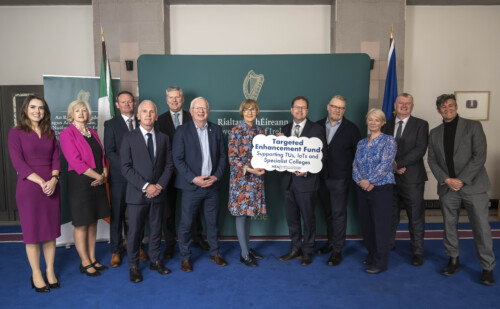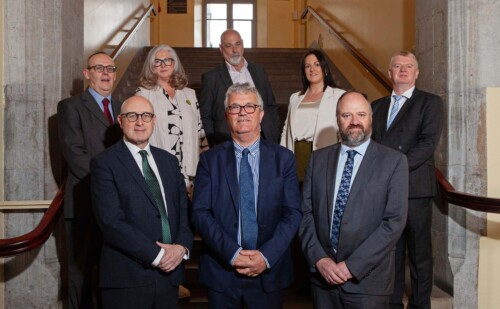€25.67m in Transformation Funding for Technological Universities announced
By Maura O'Shea
Posted: 8 September, 2021

The Higher Education Authority has today (8 September 2021) announced funding of €25.67m to higher education institutions to support them in their progression towards Technological University status and in post-establishment development.
This funding builds on the €34.33m awarded in 2020 and represents the second tranche from the Technological University Transformation Fund (TUTF). A total of €90m will be awarded over a 3-year period to assist the development and progression of technological universities.
It is anticipated that the creation of technological universities will significantly enhance progress towards national priorities, particularly in the areas of access to higher education, research-informed teaching and learning, supporting enterprise and enhancing regional development.
Applications for TU designation made by the Technological University of South-East Ireland (TUSEI) consortium and the Connaught Ulster Alliance (CUA) consortium to the Minister for Further and Higher Education, Research, Innovation and Science, Simon Harris T.D are currently under assessment.
Minister for Further and Higher Education, Research, Innovation and Science, Simon Harris, said today’s announcement represents a significant investment in Technological Universities, underlining his Department’s, and the Higher Education Authority’s, continuing commitment to supporting the very exciting changes underway in the technological higher education sector.
“The establishment of Technological University of the Shannon: Midlands Midwest on October 1 marks another important milestone for technological universities in Ireland. Two further applications for TU designation from the TUSEI and CUA consortia are currently going through the assessment and decision-making process. I look forward to continued progress in the TU sector over the coming year. The Transformation Fund will deliver for TUs, for the regions, communities and Ireland internationally,” Minister Harris said.
CEO of the Higher Education Authority, Dr. Alan Wall, together with the Chair and Board of the HEA, said despite a difficult year, significant strides have been made towards the objectives set out in the TURN report, which set out an ambitious vision for higher education transformation in Ireland.
“Munster Technological University was successfully established on 1 January 2021, and the Technological University of the Shannon: Midlands Midwest will be established on 1 October 2021. The HEA is supporting the new institutions to deliver tangible results for their regions, in addition to making significant contributions towards national strategic imperatives,” said Dr Wall.
In addition to the allocations announced today, the HEA intends to support the ongoing work of both DkIT and IADT as they pursue separate journeys toward TU status. DkIT has made significant progress on its three-year developmental pathway with the support of a special advisor appointed by the HEA, and IADT continues to advance exploration of its options under the TU Act, 2018. Funding to support further progress by both institutes will be provided in 2022.
The HEA meets regularly with the fund recipients and consults at a sectoral level via the TU Research Network (TURN), to oversee the use of the fund and to best serve the needs of each institution or consortia at its current stage in the TU trajectory.
Considerable progress has been made towards the objectives of the fund since initial disbursements were made in 2020, as evidenced by the robust monitoring systems put in place to track progress. This round of funding allocations was determined on the basis of assessed capacity and progress evidenced in meeting the objectives and ambitions outlined in the TURN Report.
ENDS
Notes for Editors
Background to the Technological University Transformation Fund (TUTF)
In Budget 2020, the Government announced the launch of a major multi-annual transformation fund of €90 million for technological universities over 3 years. The TUTF supersedes and builds upon Landscape Funding, as provided by the Higher Education Authority (HEA) and Department of Education and Skills (DES) in recent years, towards reform of the higher education landscape, including the establishment of Technological Universities.
The HEA is responsible for the design and implementation of the TUTF, with the Technological University Research Network (TURN) acting in an advisory capacity. The TURN comprises the Presidents of TU Dublin, Munster Technological University and each Institute of Technology (IoT), together with senior representatives from the Technological Higher Education Association (THEA) and the HEA.
Funding allocated through the TUTF is supporting the implementation of recommendations set out in the TURN group’s report “Connectedness & Collaboration enabled by Connectivity”, published in October 2019. The report makes a series of 12 recommendations for outcomes that will provide TUs with a solid foundation for their development. These centre upon three thematic areas that TURN identified as the essential building blocks for successful TUs:
· investment in integrated multi-campus digital infrastructure to provide regional cohesion and to facilitate new modes of learning and the prioritisation of capital investment in TUs;
· investment in research capacity building by developing researcher human capital, facilitating research activity and opportunities for existing academic staff and implementing a researcher career development and employment framework, addressing infrastructural deficits and prioritising research strategies within TUs, exploiting fully the mutually supporting roles of teaching and research; and
· realignment of the policy framework and funding for TUs including an expansion of institutional autonomy and reform through the implementation of TU-apposite career structures, the reform of the grant allocation model to accommodate TUs, the creation of a dedicated TU funding stream including in the post-establishment phase and the creation of a borrowing framework for TUs.
The report recognises that relevant priority actions can only be achieved through a structured, system-wide, relevant and dynamic process that will ensure value for money, underpinned by a robust and evidence-based set of monitoring and evaluation arrangements.
The TURN report can be accessed on the Department’s website at: https://www.education.ie/en/Publications/Education-Reports/connectedness-collaboration-through-connectivity.pdf
TU Dublin was Ireland’s first technological university and was established on 1 January 2019. Munster Technological University was established on 1 January 2021, merging Cork IT and IT Tralee.
Ireland’s third technological university will be established on 1 October 2021, with the designation of the Technological University of the Shannon: Midlands Midwest, which will merge Athlone IT and Limerick IT.
TU development consortia currently working towards TU Status include:
· The Technological University of South-East Ireland (TUSEI) consortium, comprising IT Carlow and Waterford IT, submitted an application for TU designation to the Minister for Further and Higher Education, Research, Innovation and Science, Simon Harris T.D, on 30 April 2021.
· The Connaught Ulster Alliance (CUA) consortium, comprising Galway-Mayo IT, Letterkenny IT and IT Sligo, submitted an application for TU designation to the Minister for Further and Higher Education, Research, Innovation and Science, Simon Harris T.D, on 21 May 2021.
· The Dundalk Institute of Technology (DkIT) is not currently aligned with an existing TU development consortium but is committed to becoming a
technological university and has made significant progress in advancing this ambition with the assistance of the special advisor appointed by the HEA.
· The Institute of Art, Design and Technology (IADT), Dun Laoghaire, is in the process of exploring its options under the Technological Universities Act, 2018, with support from the HEA.
In addition, the OECD has been contracted by the HEA to conduct a ‘Review of Technological University Academic Contracts, Career Paths and Organisation’, which will explore the appropriate structures and mechanisms that need to be in place to ensure that the emerging TUs are able to deliver on their mission and wider strategic objectives.
Monitoring and oversight of the TUTF
The HEA holds quarterly meetings with consortia/institutions to monitor progress towards results, as set out in the TUTF project plans. Written and financial reports on progress are required bi-annually to assess progress and capture learnings, and are considered by the HEA in determining funding allocations. Funding may be removed or redistributed at the discretion of the HEA, where circumstances change or where sufficient progress on projects is not being made in accordance with project plans.
Table 1: Exchequer funding allocations, 1st Sept 2021 – 31st Aug 2022 (€ million)
| HEI / Consortia | TUTF Year 2 Allocation |
| AIT-LIT | €5.90m |
| CUA | €4.22m |
| MTU | €4.55m |
| TU DUBLIN | €5.20m |
| TUSEI | €5.53m |
| HEA Oversight & Monitoring | € 0.27m |
| TOTAL | € 25.67m |


